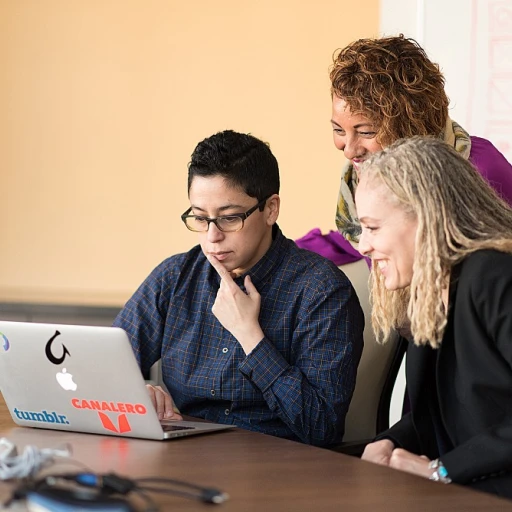
Understanding DEI in the Hiring Process
Exploring the Essence of DEI in Hiring
Diversity, Equity, and Inclusion (DEI) are central to transforming the hiring landscape across industries. The integration of DEI in the recruitment process is not merely about meeting diversity metrics; it’s about creating a more inclusive and equitable environment where diverse talent can thrive. The essence of DEI lies in fostering an inclusive atmosphere that values the unique contributions of each candidate, effectively enhancing the overall candidate experience. Hiring practices that emphasize DEI are crucial to attracting top talent. A well-defined commitment to diversity and inclusion in recruitment can significantly improve the company culture, creating an environment that resonates with a broader spectrum of candidates. Organizations that prioritize diversity equity and inclusion in their hiring processes tend to attract candidates who are more engaged and motivated. To truly understand DEI in the hiring process, it's important to consider how it helps identify and eliminate unconscious bias. While bias in hiring can be subtle, it often influences how job descriptions are crafted, the way candidates are evaluated, and the selections made by hiring managers. By addressing these biases, organizations can create a more inclusive hiring environment that promotes equity and fairness. Incorporating DEI into recruitment is not just a task for HR but a mission that involves the entire organization. Good dei initiatives provide hiring managers with the tools and knowledge they need to make sound, inclusive decisions that align with the organization's values. As a result, they are better equipped to recruit a diverse pool of talent. For a comprehensive look at how pay equity plays a significant role in DEI hiring practices, refer to the role of a pay equity consultant. This approach can enhance fairness and improve candidate experience, ultimately leading to a more engaged and committed workforce.The Impact of DEI on Employee Engagement
The Ripple Effect on Team Dynamics and Retention
Implementing DEI initiatives in the hiring process has a profound impact on employee engagement, ultimately shaping team dynamics and boosting retention rates. When diversity, equity, and inclusion are prioritized, especially during recruitment, it sets a precedent for a company culture that values varied perspectives and talents. This not only enhances the candidate experience but also creates an inclusive work environment where employees feel valued and heard. Moreover, a diverse workforce can lead to more innovative ideas and solutions, as individuals contribute their unique insights, influenced by their diverse backgrounds. Companies that prioritize diversity inclusion not only attract top talent but also nurture an atmosphere where employees are more likely to remain committed and engaged with their roles.Bolstering Morale and Reducing Bias
DEI initiatives can positively affect employee morale by fostering a sense of belonging among employees. When employees perceive their organization as committed to diversity and inclusion, it strengthens their emotional attachment to the company and motivates them to contribute their fullest in everyday tasks. This morale boost is closely linked to the reduction of unconscious bias in the workplace. Through equitable hiring practices, organizations can mitigate biases that often permeate the recruitment process, thus ensuring a fairer assessment of all job candidates. By focusing on diverse talent acquisition, hiring managers can help dismantle systemic barriers that diverse candidates may face. This proactive stance on inclusion builds a more harmonious workplace, reducing turnover and increasing employee happiness.Aligning DEI with Company Values
Lastly, when diversity, equity inclusion is deeply embedded within a company’s hiring practices, it aligns with the broader organizational values, shaping a culture that promotes engagement and satisfaction. Companies that successfully integrate DEI initiatives into their core values often see a positive shift in employee engagement metrics. As organizations continue to refine their DEI strategies, measuring success becomes crucial in understanding its impact on the workforce. Tracking changes in employee retention and engagement levels can provide insights into the effectiveness of these initiatives. With a commitment to continual improvement and embracing diversity, businesses can sustainably enhance employee engagement. For more on how diversity can positively influence employee engagement, read this insightful post.Strategies for Implementing DEI in Recruitment
Building a Framework for Successful Implementation
Creating a recruitment process that champion's diversity, equity, and inclusion (DEI) requires targeted strategies that resonate with both current and potential employees. The goal is to establish an environment where diverse talent can thrive from the outset, enhancing the overall candidate experience.
Crafting Inclusive Job Descriptions and Requirements
Language is a powerful tool. When crafting job descriptions, it’s crucial to use inclusive language that attracts a wide array of candidates. Clear and simple wording can help eliminate unconscious bias, allowing your recruitment efforts to reach a broader, diverse audience. Be mindful to avoid jargon or terminology that might alienate potential talent. More insights on crafting impactful language can be found here.
Engaging Diverse Talent Pools
To build a diverse workforce, tapping into different talent pools is essential. Partner with community organizations, schools, and online platforms that cater to underrepresented groups. By actively recruiting in diverse arenas, companies can increase the scope of their talent acquisition strategies, ensuring their hiring pool is as wide and varied as possible.
Training Hiring Managers on DEI Practices
Organizational change often begins with those in leadership positions. Equipping hiring managers with DEI training can significantly bolster an organization's commitment to inclusion. This education helps decision-makers understand their own biases and teaches them practical ways to implement equitable hiring practices.
Incorporating DEI in Company Culture
A company's culture speaks volumes about its true dedication to diversity and inclusion. By embedding DEI principles into the workplace culture, you not only make current employees feel valued and involved but also attract potential candidates who are seeking an inclusive work environment. Having a robust DEI policy is not merely a recruitment tactic; it is integral to the organization's core values and a reinforcing element of its broader mission.
Implementing these strategies effectively requires a continuous commitment to improving the hiring process. Organizations must be willing to adapt and respond to feedback, ensuring their DEI initiatives are both impactful and sustainable in the long run.
Measuring the Success of DEI Initiatives
Tracking Progress of Diversity Initiatives
To genuinely enhance employee engagement, it is crucial for organizations to measure the success of their DEI initiatives effectively. This requires a structured assessment of the diversity, equity, and inclusion efforts implemented in your hiring practices and work environment.
Utilize Metrics and KPIs
Implement key performance indicators (KPIs) that are relevant to your DEI goals. Common metrics may include the diversity of candidates in your talent pool, the rate of diverse talent being hired, and the retention rates of employees from diverse backgrounds. By analysing these metrics, organizations can identify trends and assess whether their DEI initiatives are translating to a more inclusive workplace.
Employee Surveys and Feedback
Conducting regular surveys and seeking feedback from all employees can help gauge the effectiveness of DEI strategies in fostering an inclusive company culture. This process provides valuable insights into how inclusive employees feel and allows organizations to make necessary adjustments to their DEI efforts. Gathering feedback is essential to understand the first-hand experience of employees regarding DEI in the recruitment process and beyond.
Regular DEI Audits
Consider conducting audits to assess DEI practices critically and objectively. These audits help identify areas of improvement in the recruitment process and within the organizational structure. Auditing can reveal unconscious biases that may exist at different stages of the hiring process, helping to create a more equitable experience for all candidates.
Benchmark Against Industry Standards
Another way organizations can measure the success of their DEI initiatives is by comparing their progress to industry standards. Understanding where your organization stands in relation to peers can highlight areas of strength and opportunities for enhancement. Moreover, this benchmarking can guide companies in setting realistic goals for their DEI recruitment strategies.
Overcoming Challenges in DEI Implementation
Addressing Unconscious Bias in Recruitment
One of the most significant challenges in implementing DEI initiatives is overcoming unconscious bias in the hiring process. Bias can subtly influence decisions, often without the hiring manager even realizing it. This can hinder the recruitment of diverse talent and negatively impact the candidate experience. Organizations need to provide training to help employees recognize and mitigate these biases, ensuring a more inclusive recruitment process.
Crafting Inclusive Job Descriptions
Job descriptions are often the first point of contact between a candidate and a company. However, they can unintentionally exclude diverse candidates if not carefully crafted. It's essential to use inclusive language that appeals to a broad audience, avoiding jargon or terms that might alienate certain groups. This approach not only attracts a wider pool of talent but also reflects the company's commitment to diversity and inclusion.
Ensuring Equity in the Hiring Process
Equity in hiring practices is crucial for fostering a diverse workforce. This involves creating a fair recruitment process where all candidates have equal opportunities to succeed. Companies can achieve this by standardizing interview questions, using diverse hiring panels, and implementing blind recruitment techniques to focus on skills and experience rather than personal characteristics.
Building a Supportive Company Culture
Creating an inclusive work environment goes beyond the recruitment process. It requires a company culture that values diversity and promotes equity and inclusion. Organizations should encourage open dialogue about DEI, celebrate diverse perspectives, and provide support systems for underrepresented groups. This not only enhances employee engagement but also helps retain top talent.
Measuring and Adjusting DEI Initiatives
To ensure the success of DEI initiatives, organizations must regularly measure their impact and make necessary adjustments. This involves collecting data on diversity metrics, candidate feedback, and employee engagement levels. By analyzing this data, companies can identify areas for improvement and implement best practices to enhance their DEI efforts.
Case Studies: Successful DEI Practices
Real-Life Applications of DEI in Recruitment
Many organizations have adopted Diversity, Equity, and Inclusion (DEI) initiatives to transform their recruitment processes. By focusing on creating inclusive and equitable hiring practices, these companies not only enhance the candidate experience but also build vibrant and diverse workplaces. Let’s explore some successful applications of DEI initiatives in various companies.
Improving Job Descriptions
A well-known tech company revamped its job descriptions to remove gender-biased language and reduce jargon that may deter diverse talent from applying. By focusing on skills and outcomes rather than unnecessary qualifications, they attracted a broader range of candidates. This not only improved the diversity of their applicant pool but also led to higher employee engagement.
Training Hiring Managers
Another organization implemented unconscious bias training for its hiring managers. By raising awareness and encouraging equitable treatment, they improved decision-making throughout the recruiting process. This training supported the recruitment of diverse candidates and promoted inclusion within the company culture.
Leveraging Diverse Talent Pipelines
An international corporation established partnerships with community organizations and universities to tap into diverse talent pools. By promoting inclusion and participation in industry events, they expanded their reach to understudied demographics, enriching the hiring process and boosting morale within the organization.
Creating Strategic DEI Frameworks
A financial firm designed a comprehensive DEI framework that outlined clear objectives for diversity and equity inclusion. Through measurable goals and action plans, they held themselves accountable, further engaging their workforce and reinforcing a company culture that values diversity inclusion.
These case studies demonstrate that adopting DEI practices in recruitment can significantly impact employee engagement. By prioritizing these principles, organizations can effectively attract top talent and establish a more harmonious workplace environment.













